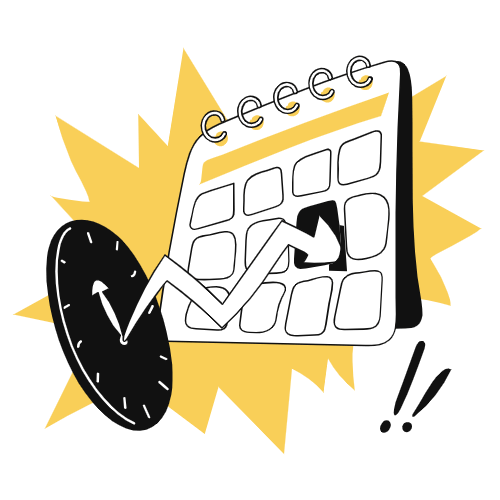10 Hilarious Ways to Stop Procrastinating
(That Actually Work!)

Introduction: The Procrastination Plague
We’ve all been there—staring at a mountain of work while our brains come up with a million reasons to delay it. Procrastination is like that annoying friend who always convinces you to watch just one more episode. But what if you could outwit your procrastination in the most ridiculous, yet effective ways? This guide isn’t just another list of boring tips; it’s packed with hilarious strategies that will make you laugh while you kick procrastination to the curb.
The “Time-Travel” Method
Imagine you’re in a sci-fi movie where you can see your future self. Would Future You be thrilled about binge-watching another season of Stranger Things, or would they prefer you finished that project? Use this mental trick to “travel” to the future and have a stern talk with yourself. You’ll find that doing the work now might just save Future You from a world of stress.
Research Insight: Studies show that visualizing your future self can actually increase your motivation to complete tasks now. According to a study by Hal Hershfield at UCLA, when people are made to feel closer to their future selves, they are more likely to engage in productive behaviors like saving money or completing tasks.
The “Dance Party” Technique
Set a timer for 25 minutes (the famous Pomodoro Technique) and work as hard as you can. When the timer goes off, blast your favorite upbeat song and dance like no one’s watching. This burst of physical activity not only gets your blood pumping but also injects a dose of fun into your workday.
Book Reference: The Power of Full Engagement by Jim Loehr and Tony Schwartz discusses the importance of managing energy, not just time. A quick dance break can re-energize you and improve focus.
The “Outrageous Outfit” Strategy
Dress for success? How about dressing to make yourself laugh? Wear the silliest outfit you own—whether it’s a superhero cape, mismatched socks, or a ridiculous hat—while you work. The absurdity of your attire can lighten the mood and make tackling that dreaded task a little less daunting.
Research Insight: A study published in the Journal of Experimental Social Psychology found that what we wear can influence our psychological state and performance. So why not use that to your advantage in a fun way?
The “Procrastination Jar”
Create a jar filled with slips of paper, each containing a random (and silly) task. Every time you feel the urge to procrastinate, pull out a slip and complete the task. It could be anything from “Do 10 jumping jacks” to “Write a haiku about your current task.” It’s a great way to distract yourself momentarily and get back to work with renewed focus.
Book Reference: Atomic Habits by James Clear talks about the power of small changes and routines. The Procrastination Jar adds a fun twist to creating new habits.
The “Two-Minute Rule”
Tell yourself that you only need to work on a task for two minutes. Often, the hardest part of overcoming procrastination is getting started. Once you begin, you’ll likely keep going far beyond those initial two minutes.
Research Insight: David Allen, in his book Getting Things Done, introduces the Two-Minute Rule as a way to overcome inertia and make tasks seem less intimidating.
The “Talking To Yourself” Trick
Have a full-on conversation with yourself about why you’re procrastinating. Use a silly voice or pretend you’re a character in a movie. This humorous approach can help you confront your reasons for delaying the task and motivate you to get started.
Research Insight: According to a study published in Scientific American, self-talk, especially when spoken out loud, can help improve focus and self-regulation.
The “Procrastination Bingo”
Create a bingo card filled with common procrastination activities (like “Check social media,” “Make a snack,” “Stare out the window”). Each time you catch yourself doing one, mark it off. When you get a bingo, you owe yourself a reward—but only after you finish the task you’ve been avoiding!
Book Reference: The Willpower Instinct by Kelly McGonigal explores how understanding and managing willpower can help in overcoming procrastination. Turning it into a game like Bingo makes it a fun challenge.
The “Reverse Psychology” Gambit
Tell yourself you absolutely cannot work on the task you’re avoiding. Sometimes, reverse psychology can kick your brain into gear and make you want to do the exact opposite of what you’re telling yourself.
Research Insight: A study published in the Journal of Experimental Social Psychology suggests that reverse psychology, when used strategically, can be an effective way to motivate yourself to perform a task you’re avoiding.
The “Deadline Dare”
Challenge a friend or colleague to a Deadline Dare. Set a timer and see who can complete their task first. Loser buys coffee or does a silly dare. The competitive element adds a fun twist to getting things done.
Book Reference: Drive by Daniel Pink discusses how autonomy, mastery, and purpose drive motivation. Adding competition taps into our natural drive to excel, making it easier to overcome procrastination.
The “Gratitude Reminder”
Keep a list of things you’re grateful for on your desk. Whenever you feel like procrastinating, take a moment to read through it. It’s a simple way to shift your mindset and remind yourself why your work matters.
Research Insight: According to a study published in Psychology Today, practicing gratitude can increase your overall well-being and motivation. It’s a small but powerful tool in the fight against procrastination.
Conclusion: Laughing Your Way to Productivity
Procrastination doesn’t have to be a constant battle. By using these hilarious, yet effective strategies, you can turn a dreaded task into something fun and manageable. Remember, the key is to find what works for you—and if that involves dancing in a ridiculous outfit, so be it! The goal is to outsmart your inner procrastinator and get things done with a smile on your face.
References
- Hershfield, H. E. (2011). Future self-continuity: How conceptions of the future self transform intertemporal choice. Journal of Experimental Psychology: General.
- Loehr, J., & Schwartz, T. (2003). The Power of Full Engagement: Managing Energy, Not Time, is the Key to High Performance and Personal Renewal. Free Press.
- Clear, J. (2018). Atomic Habits: An Easy & Proven Way to Build Good Habits & Break Bad Ones. Avery.
- Allen, D. (2001). Getting Things Done: The Art of Stress-Free Productivity. Penguin Books.
- McGonigal, K. (2012). The Willpower Instinct: How Self-Control Works, Why It Matters, and What You Can Do to Get More of It. Avery.
- Pink, D. H. (2009). Drive: The Surprising Truth About What Motivates Us. Riverhead Books.
- Emmons, R. A., & McCullough, M. E. (2003). Counting blessings versus burdens: An experimental investigation of gratitude and subjective well-being in daily life. Journal of Personality and Social Psychology.











